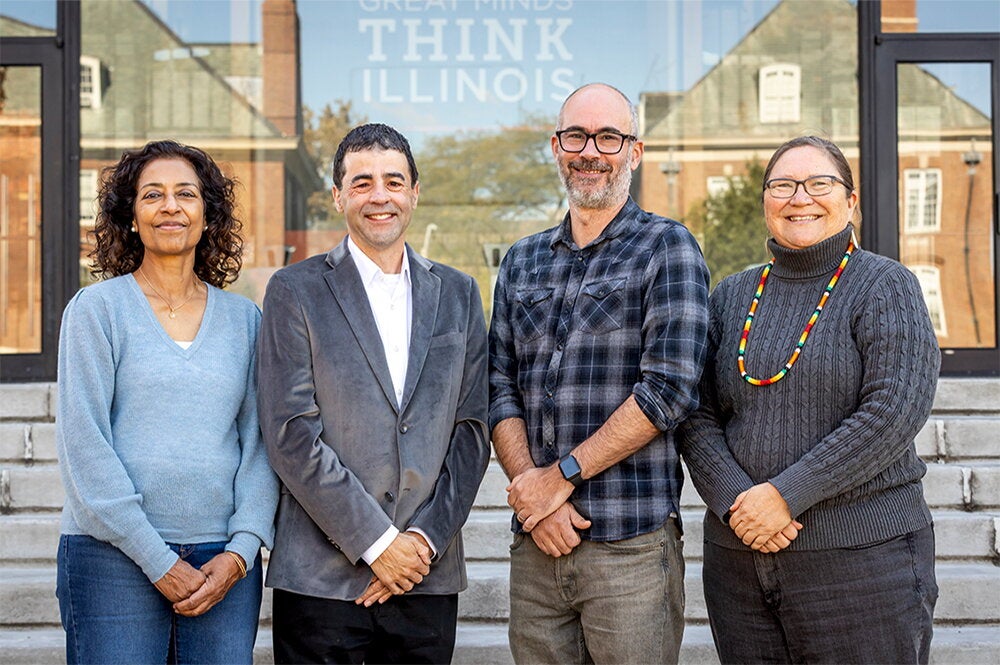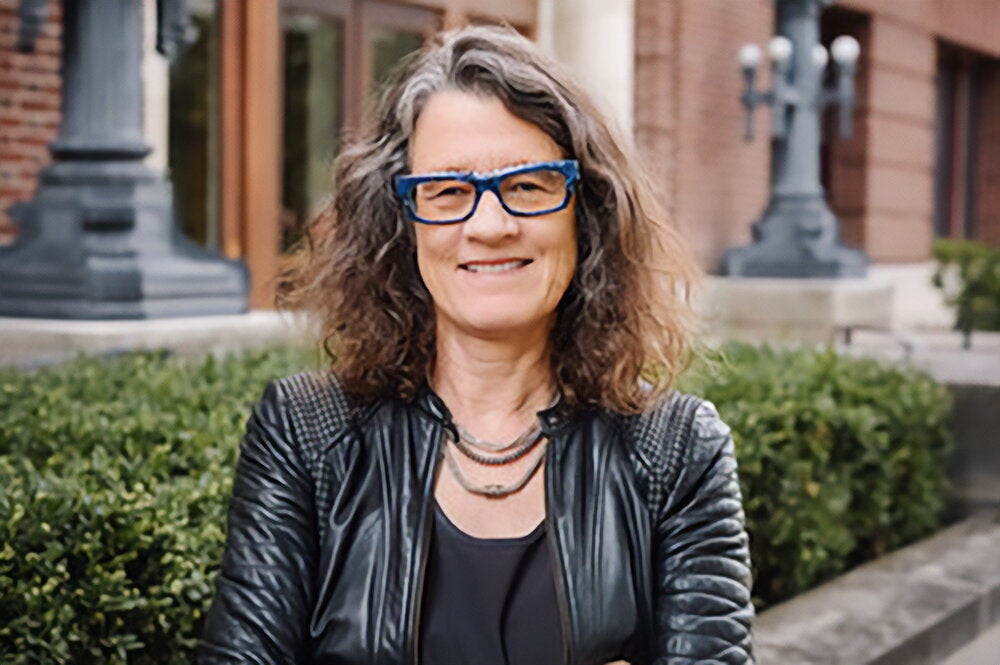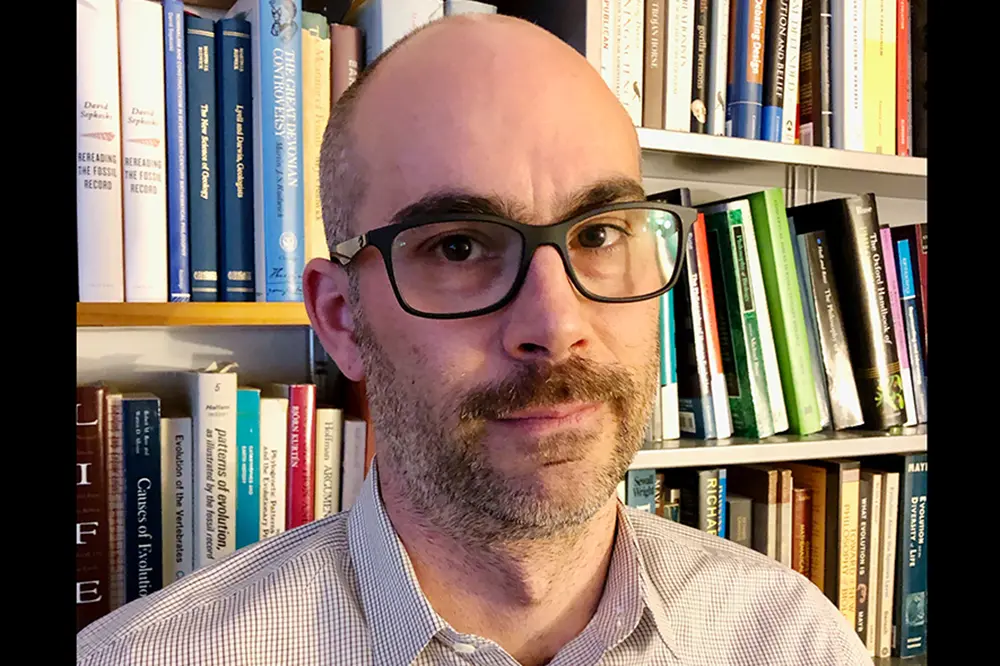
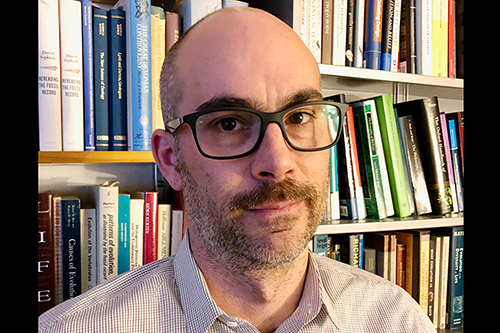
We rely on scientists to understand the structure and behavior of our world. What happens when a scientist’s ability to separate science from ideology comes into question—and they happen to be one of the most renowned scientists in their field?
David Sepkoski, the Thomas M. Siebel Chair in the History of Science at U of I, has co-written an essay, “Ideology as Biology,” which examines the influence of racism in the career of Edward O. Wilson, late Harvard professor and a giant in the study of biodiversity conservation. Drawing from recently discovered personal correspondence from Wilson related to his 1975 book, “Sociobiology: The New Synthesis,” Sepkoski and his co-writer, Mark Borello, a professor of biology history at the University of Minnesota, shed new light on the ideas of a man once called a modern-day Darwin.
The essay, published in The New York Review of Books almost two months after Wilson’s death in December 2021, has “forced a reckoning about legacies of racism in biology,” said Sepkoski, including the retraction of an award in Wilson’s name by a major scientific society and an acknowledgement from the E.O. Wilson Biodiversity Foundation.
Sepkoski recently answered questions about the essay for the College of LAS.
What is sociobiology? What was controversial about the way E.O. Wilson applied it to human behavior?
“Sociobiology” is the name Wilson gave to the study of the evolutionary basis for animal behavior (and the title of his 1975 book on the subject). While people have been studying this topic since Darwin himself (despite its title, Darwin’s 1871 “Descent of Man” is mostly about the evolution of social behavior in animals), Wilson attempted to draw together fields like ethology (the study of animal behavior), evolutionary biology, psychology, population biology, and genetics to create what he called a “new synthesis.” “Sociobiology: The New Synthesis” (Wilson’s book) was largely about non-human animals, particularly social insects, birds, and mammals, but it included a final chapter on humans.
It’s that final chapter that drew the most attention and criticism: Wilson fairly freely speculated about the evolution of behavioral traits that can explain human sex differences, which many saw as a justification for gender imbalances in the workplace and elsewhere, while others were concerned that Wilson’s ideas could endorse viewing human groups or “races” as having evolved different abilities. Wilson made his reputation as an expert on ants, so his work on invertebrates and other non-human species was fairly uncontroversial; it was the decision to apply the study to humans—and to do so in a way that seemed to many observers to be highly speculative—that caused controversy.
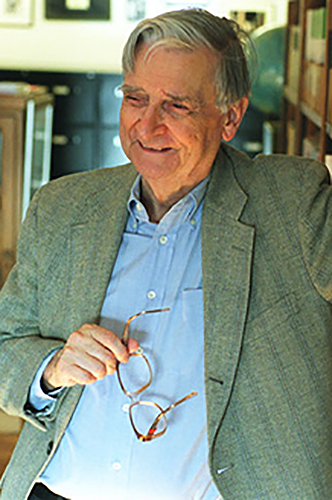
You say that Wilson and his opponents came to an “uneasy truce” over his work in sociobiology. How do his ideas in this area still resonate today?
While the sociobiology controversy raged most fiercely in the late 1970s and early 1980s, by the 1990s scientists had mostly moved on to other questions. While sociobiology was never established as the grand “synthesis” Wilson envisioned, his ideas fairly directly inspired the field of evolutionary psychology and, following the decoding of the human genome, behavioral genetics. Notably, these are both fields that employ biological terms and concepts, but which are not, for the most part—when applied to humans—practiced by biologists. In other words, sociobiology completely failed to revolutionize biology, but it spawned a resurgent interest in evolutionary or genetic bases for human behavior and ability.
The 1994 bestseller “The Bell Curve,” by psychologist Richard Herrnstein and conservative policy advocate Charles Murray was deeply indebted to sociobiology. Herrnstein and Murray infamously argued that all human abilities (like intelligence) will fall across a normal distribution curve—a “bell curve”—and moreover that these distributions will be unequally weighted in certain populations, which the authors were happy to assign to “races.” Other, more recent studies in fields like behavioral genetics that attempt to determine the “genes” for traits like intelligence, loyalty, political preference, etc. are likewise indebted to sociobiology for raising the profile and legitimacy of research questions that formerly had been associated with discredited fields like eugenics. Again, it’s important to note that most practitioners of these fields are not biologists or geneticists, but rather psychologists, sociologists, economists, and other social scientists.
Defenders of Wilson say that his critics are motivated by ideology and unable to produce evidence that would demonstrate that sociobiology or hereditarian theories of innate human ability are racist. How have you countered that argument?
It’s first important to point out that an individual scientist need not be racist in order for his or her work to contribute to racist social outcomes. In fact, personal beliefs hardly make a difference one way or another in this respect. Francis Galton (the pioneer of eugenics) viewed his dream of breeding a “better” race of humans as “humanitarian,” since he felt it would alleviate suffering. His politics were nothing like Hitler’s, but that didn’t stop the Nazis from using eugenics as a justification for the extermination of Jews, gay people, the Roma, the disabled, etc. I get awfully tired of hearing defenders of lousy, biased science respond “but [scientist x] isn’t a racist—he’s a really nice guy!” or whatever. I can’t speak to what motivates individuals to pursue research questions, but of the nearly infinite number of possible topics to study, why choose investigating whether intelligence has a racial distribution? What burning question or major problem will this solve?
But of course, the main problem is that most of human sociobiology or its cognates—evolutionary psychology and human behavioral genetics—is junk science. Behavioral traits are incredibly complex, and if they have a genetic basis are likely distributed widely across many sites in the genome—they are highly “polygenic,” in other words. Moreover, we’re only beginning to understand how environment influences genetics and vice-versa—there’s simply no way to design a scientific study that can cleanly separate out what the “hereditary” component of, say, “educational achievement” is. Animal behavioral genetics is able to perform experiments that we simply can’t ethically allow with humans, so our basis for understanding the genetics of animal behavior is a lot stronger. Human behavioral geneticists know this, but rather than simply acknowledge that human social organization is so much more complex than, say, birds’ or ants’, and that we’ll never be able to perform similar experiments on humans, they persist in attempting to divine the “heritability” of human behavioral traits anyway. And they often mislead laypeople about the reliability of their studies, or are so uninformed themselves about biology that they don’t realize how bad their work is.
In other words, I think the decision to pursue these kinds of questions about innate human difference are pretty “ideological,” whether or not proponents admit it. And moreover, as a historian, I’m deeply committed to the notion that all aspects of human culture—including science—are invested with politics or “ideology.” That’s not a bad thing: what is bad about sociobiology and behavioral genetics is that it’s poor science motivated to answer “questions” that have dubious social value.
Did racism bleed into Wilson’s other work? Are other areas of his work, such as biodiversity conservation, affected in the same way that his work on sociobiology was affected?
That’s a tough question, and it’s one I’m continuing to investigate. One of Wilson’s last major ideas was the so-called “half-earth” proposal: the idea that humans should leave half the planet’s surface available to non-human organisms. Some people have pointed out that a lot of the area Wilson suggested should be left to nature is in the Global South. There have also been criticisms of some of Wilson’s work on ant behavior—for example, his evocative descriptions of ant “colonies” or his assertion that some ants practice “slavery”—as naturalizing harmful human practices. I don’t really have a position on these topics yet.
I do want to emphasize, though, that one can decry Wilson’s endorsement of racism in one context and value his contributions to ants, or biodiversity, in another. Humans are complex creatures—much more so than Wilson acknowledged, I think!—and lead messy lives. I do think we need to reckon with how we celebrate and lionize the achievements of people who have contributed harmful views, but I’m not calling for the “cancellation” of anyone.
What has the reaction been to your essay? What idea or message do you hope people will take to heart?
I was concerned that there might be a violent backlash to the article from Wilson’s many admirers and supporters, but for the most part, that hasn’t happened. I know some people aren’t happy that the essay was published shortly after Wilson’s death, but very few people have challenged the evidence or our interpretation of it. There’s been a lot of sadness and dismay, but not much anger.
More positively, I’ve fielded comments from many scientists and laypeople who acknowledge that this episode has made them think more deeply not just about Wilson, but about unexamined legacies of racism, sexism, or other forms of bias in science. Ultimately, that was the goal of this essay: to break through defensiveness and start a more nuanced conversation. That conversation has just begun, but I’m optimistic that it will lead to structural changes in how scientists are recruited and trained, how they choose research questions, and how the public is informed about the potential impact of science.
